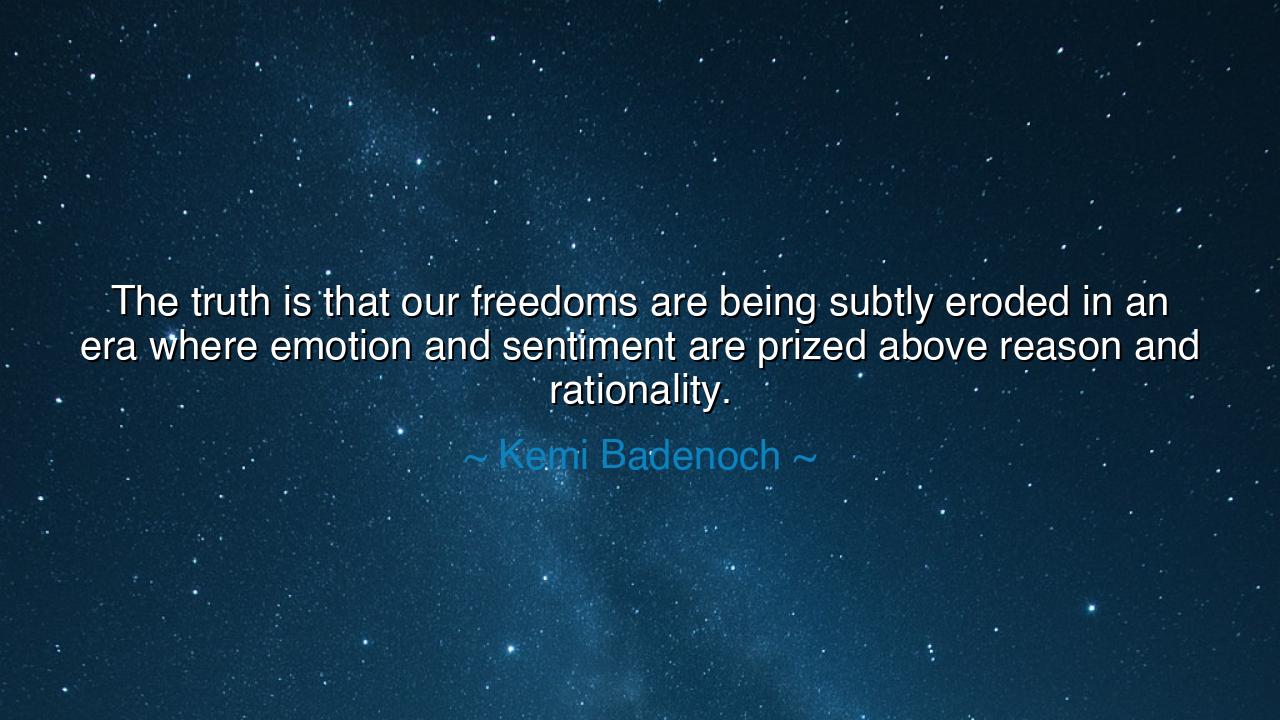
The truth is that our freedoms are being subtly eroded in an era
The truth is that our freedoms are being subtly eroded in an era where emotion and sentiment are prized above reason and rationality.






Kemi Badenoch, in words that resound like the tolling of a warning bell, declared: “The truth is that our freedoms are being subtly eroded in an era where emotion and sentiment are prized above reason and rationality.” This saying is no idle remark, but a sober recognition of the quiet dangers that threaten liberty. For rarely does freedom vanish in one great stroke; more often it is worn away, grain by grain, by those who elevate feeling over truth, and sentiment over the steady hand of reason.
The origin of this insight lies in the timeless tension between passion and discipline. Human beings are creatures of deep emotion, stirred by grief, anger, or sympathy. These are noble powers when guided, but destructive when enthroned above rational thought. A society that bases its laws on momentary sentiment, rather than enduring principles, risks losing the very foundation of its freedom. Badenoch warns that this slow erosion often escapes notice, for it comes clothed in compassion, in outrage, in the sweet language of care. Yet beneath it lies the surrender of the mind to the tyranny of impulse.
History bears witness to this peril. Recall the fall of Athens after the Peloponnesian War. The people, once lovers of reason and philosophy, grew captive to demagogues who stirred their emotions with fiery speeches. Judgments once made with careful thought were swayed instead by anger, fear, and flattery. The trial of Socrates stands as a symbol: a man condemned not by reason, but by resentment. In that moment, freedom was wounded, not by external enemies, but by the triumph of sentiment over rationality.
So too in the modern world, freedoms have faltered when passion drowned out principle. The internment of Japanese-Americans during World War II was not born of reason, but of fear—an emotional storm that blinded a nation to justice. Leaders gave in to sentiment rather than truth, and liberty was stripped from thousands. Here we see the slow erosion of freedom: it does not always roar with chains, but whispers with justifications born of unchecked emotion.
Badenoch’s warning is also a call to vigilance. For the erosion she speaks of is subtle. It does not announce itself. It arrives disguised as kindness, as safety, as the pursuit of harmony. But in silencing reason, it silences dissent. In enthroning emotion, it undermines the patient process of rational debate. If left unchallenged, this subtle tide becomes a flood that washes away the stones of liberty, leaving only shifting sands.
The lesson, then, is clear: if we wish to preserve freedom, we must guard the place of reason in both public life and private thought. This does not mean despising emotion, for feeling gives color to existence. But it must be balanced, checked, and guided by rationality. Freedom cannot rest on the winds of passion, for they change with every storm. It must rest on principles, tested and proved by thought.
Practically, this means training ourselves to question before we judge, to reflect before we act, and to weigh evidence before we decide. It means resisting the seduction of outrage that spreads like fire across our age. It means listening, even when emotion urges us to shout. And above all, it means cherishing the disciplines of reason—study, debate, dialogue—as the guardians of liberty.
Thus Badenoch’s words stand as a sentinel’s cry: the truth is that freedom fades where reason is abandoned. Let us not be lulled into surrender by the soft chains of sentiment. Let us instead be a people who honor both heart and mind, but who place truth and reason upon the throne. For only then shall our freedoms endure, not as relics of the past, but as the living breath of generations yet to come.






TQNguyen thi to quyen
Badenoch’s comment about the rise of emotionalism over rationality is concerning, as it suggests that we may be losing the ability to engage in thoughtful, reasoned debates. But is it possible that the growing focus on emotional responses is a reflection of deeper societal issues? Could the erosion of freedoms be a symptom of a larger cultural shift towards individualism and immediate gratification, where reason is no longer prioritized?
GDGold D.dragon
Badenoch’s view that sentiment is eroding reason and rationality brings up an interesting dilemma. Are we allowing emotional responses to replace thoughtful analysis in the decisions we make? Is this shift in priorities threatening the very freedoms that are supposed to be protected by reasoned laws and policies? How can we better foster rational thinking in a world that often seems driven by emotion?
NKNgan Kim
I see Badenoch’s point that sentiment can sometimes cloud rational decision-making, leading to a loss of freedoms, but I wonder if there are times when emotion is necessary. For example, how do we balance empathy and logic in issues like human rights, where sentiment plays a significant role? Is there a way to protect our freedoms while also acknowledging the power of emotion in shaping societal decisions?
DCNguyen Dinh Chuong
Badenoch’s quote raises a compelling point about the erosion of freedoms in the context of emotionalism over reason. It seems like the more we let emotions dictate policy and public opinion, the more vulnerable our freedoms become. But how do we ensure that reasoned arguments don’t come across as cold or detached? How can we make rationality appealing without losing touch with what people care about emotionally?
TLThuy linh
I completely agree with Badenoch’s concern about how emotions are overshadowing rational thought, especially in political and social discussions. But does this mean that emotions have no place in decision-making? Can we ever truly separate emotion from reason, or is the key to finding a healthy balance between the two, especially when it comes to protecting our freedoms?